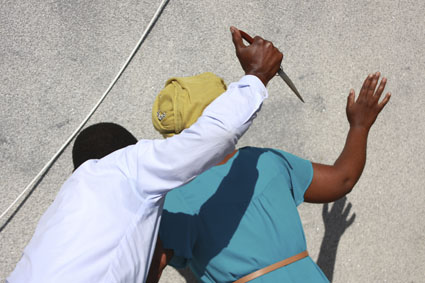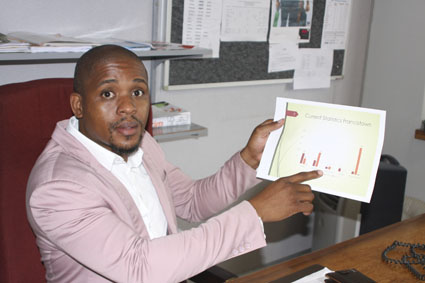Botswana still safe for women
22 Oct 2020
The horror started with the slightest of beatings and pinching for a banker and mother of two, who was later beaten to death by her husband.
The police launched a manhunt for the suspect, who had fled the scene.
“Before taking his wife’s life, the suspect used to tie her, beat her and take her mobile phones away, according to a neighbour.
Sometimes the man would lock her up in the house for two consecutive days to keep her away from the eyes of the people, while at month ends, the suspect would take her whole salary and go and enjoy it with other women.
Such a tale might seem like the imaginations of a particularly lurid and sadistic cinematographer, but, tragically, it is true.
It is said that as the coronavirus continues to wrack havoc globally, nations are also forced to deal with another pandemic being gender based violence (GBV).
The stress triggered by COVID-19 lockdowns and economic uncertainties reportedly exacerbates violent assaults, according to experts at the Maun-based Women Against Rape (WAR).
They say effectively, the pandemic has forced many women, who are in abusive relationships, to remain at home with their abusers, further escalating the risk.
Most of the women interviewed by this newspaper indicated that Botswana was slowly becoming an unsafe place for women; indicating that cases of GBV had increased dramatically, especially during the lockdown period.
The SADC Executive Secretary, Dr Stergomena Lawrence Tax’s April 22 report on COVID-19, GBV and Domestic Violence indicates that since the onset of the COVID-19 pandemic, cases of domestic violence had been rising significantly across the globe, particularly following lockdown measures instituted by governments to contain the spread of the virus. SADC has not been spared.
Similarly, the UN Women report shows that some countries around the world, particularly those highly affected by COVID-19, have registered up to 30 per cent increase in reported domestic violence cases and around 33 per cent increase in emergency calls for GBV, with women and girls being the victims of the acts.
Gender Based Violence is both prevalent and pervasive.
The National Relationship Study conducted in 2018 shows that prevalence of GBV was 37 per cent for women and 21 per cent for men.
For the period April 1 to June 30, 2020, after extreme social distancing, Botswana Police Service recorded a total of 531 cases of domestic violence, encompassing murder, threat to kill, rape and defilement.
The current statistics for Francistown indicate that from January to September this year, the police and BONELA recorded 44 and three cases of rape respectively, while during the same period, the police recorded 108 cases of defilement and BONELA recorded one.
There were 21 cases of threat to kill recorded by the police during the same period, while BONELA recorded 16.
There were 23 murder cases recorded during the same period.
Regarding physical abuse, the police recorded 192 cases, while BONELA recorded five.
The police stated that during the COVID-19 lockdown period, pre-existing gender inequalities and power dynamics that fueled violence in the home worsened, adding that violence against children was also prevalent in the country.
Botswana was also ranked number two in the whole world by the World Population Review of 2019, as a country with the highest rape cases at 92.9 per 100 000 citizens, a picture that taints the country’s image.
A renowned gender activist, Ms Keabonye Ntsabane has called on victims of GBV to stand up and speak out, rather than protecting perpetrators, who at the end of the day, may kill them.
Ms Ntsabane, who is also the founder of Keabonye Ntsabane Gender Based Violence Trust (KNGBVT), explained that it was through speaking out that cases of GBV could be understood and strongly condemned.
She said it was vital for survivors to share their stories, so that people could understand the vile of the scourge.
“Keeping silent is what most victims do after they have been violently attacked, harassed or forced to do a sexually related act against their will.
The perpetrators will do the same to another person, and the cycle of gender-based violence continues,” she explained.
Ms Ntsabane said even though those who spoke up risked being doubted, punished or victim-shamed by society, they should come out to end the scourge.
She said men and boys were also affected by physical assault and rape, but in most cases, they keep silent because of the social stigma regarding their perceived lack of machismo and other disparagements of their masculinity.
“I believe men should start supporting one another just like women have chosen to do.
Encouraging survivors to speak up, creating awareness, providing support for survivors and educating them and the public about GBV is what it will take to end this vice,” she reiterated.
Ms Ntsabane said there were many ways of reporting gender-based violence, adding that technology could be used for combating the depravity, such as sharing a blog post on their experiences and taking part in social media campaigns that could also create awareness and sensitise the public.
WAR coordinator, Ms Peggy Ramaphane, says figures in the 2018 National Relationship Study might not be an actual representation because some of the cases go unreported due to the stigma.
“Some cases of GBV are carried undercover because some victims tend to protect perpetrators for various reasons, chiefly to protect the family from embarrassment,” she said.
Ms Ramaphane said violence against women and girls was the most pervasive human rights abuse in the world, affecting every country and community, adding that one in three women would experience some form of abuse in her lifetime.
Senior gender officer at the Francistown Department of Gender Affairs office, Mr Kabelo Tsiang also underscored the fact that cases of GBV were not taken seriously by the victims, who often failed to report them to relevant authorities.
He explained that a shelter that was recently established in Francistown to cater for GBV survivors started with 22 victims, 14 women, two men, four boys and two girls.
Mr Tsiang explained that nine were currently sheltered at the centre, while five were discharged and the remaining cases were referrals.
He said the centre provided temporary accommodation, legal and medical assistance to women and their children, counselling and referrals to other relevant services for women and men in abusive relationships.
He said it also ran an economic empowerment and outreach programme, which taught life and survival skills, adding that children from violent family environments were also catered for at the centre.
Mr Tsiang said in normal situations, children were only transferred to other centres such as SOS and family homes in serious cases, where government was worried about their safety.
Meanwhile, Jazz lady Nono Siile has released an album titled Borre hands off the girl child as a way of fighting GBV against women and the girl child in Botswana.
Siile, who has been outspoken about her own abuse that was highly publicised in 2014, said it was vital for Batswana to rebuild the moral fabric of their society.
When all is said and done, the question remains: ‘Is Botswana a safe place for a woman?’ ENDS
Source : BOPA
Author : Thamani Shabani
Location : FRANCISTOWN
Event : Interview
Date : 22 Oct 2020







